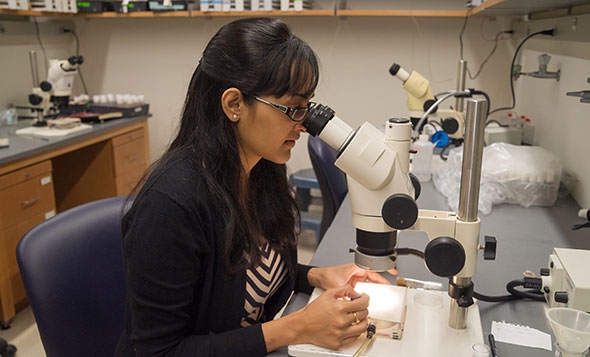It takes years for graduate students to conduct research and write a dissertation, but recently eight of these experienced researchers explained their studies in just three minutes.

Their brief lectures came during a workshop this fall that gave Dartmouth graduate students an opportunity to sharpen their presentation skills and hear reactions and advice from audience members. The event, co-hosted by Dartmouth Graduate Studies and Dartmouth Graduate Women in Science and Engineering, was part of GWISE’s larger effort to develop professional skills and connect women across departments.
At the conclusion of the event, Archana Murali, a seventh-year PhD student in the molecular and cellular biology program, was chosen as the best presenter by the voting attendees. Her presentation, which focused on Mad Cow disease, is featured in the video below:
Preparing for a short talk, Murali says, was challenging.
“It really forced me to look at the larger picture and the bare minimum that I would want people to remember about my work,” says Murali, who expects to graduate in June.
The workshop was educational for the audience but also for the speakers, who received written and verbal comments from attendees. Aarathi Prasad, a co-chair of GWISE, says the goal of the organization is “to provide opportunities for graduate students to meet and interact with each other and also hone their professional skills.”
Presenter Anna Prescott says the workshop did just that.
“I now have a better idea of how much detail others can absorb when they aren’t familiar with my kind of research,” says Prescott, a GWISE co-chair. She says a goal for the event was for students to get practice giving brief talks.
“The idea behind it is that at networking events, conferences, and interviews, we are often expected to describe our research in a very short time, with no PowerPoint slides or figures, and we usually aren’t very good at it,” says Prescott. “This workshop is a chance to practice describing our research in this format and to get feedback from others about what worked well.”
GWISE, which is open to all graduate students, hosts academic workshops as well as social networking events to further the careers of women in science. Female graduate students in science fields, Prescott says, are often outnumbered by their male counterparts in classes and laboratories.
“Feeling isolated or lacking social support can affect one’s success in graduate school, so part of GWISE’s purpose is to create a social network through which one can meet other female grad students in similar kinds of fields with similar experiences,” says Prescott, a psychological and brain sciences PhD student.
While opportunities have increased for women in science over recent years, there is still work to be done.
“Because gender bias still exists,” says Prescott, “it’s important to make sure that women are that much more prepared when entering the job market.”
In addition to programming for graduate students, GWISE hosts outreach events for undergraduates and younger women to help fuel interest in science. Previous events have included a panel discussion with sophomores to discuss graduate school and a day when undergraduates shadowed graduate students. This spring, GWISE plans to host “Science Day,” an open house event for young female students in elementary and middle school.
It is events like the three-minute presentations, Murali says, that make Dartmouth’s graduate experience unique.
“What I like about graduate life at Dartmouth,” says Murali, “is that it has provided me with a supportive environment where collaborations and discussions are welcome.”
